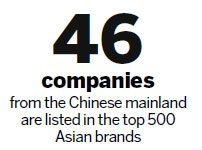E-business growth leads real economy
|
Industrial and Commercial Bank of China ranks second on the list of the top 500 Asian brands. Chen Junmin / For China Daily |
The brand value of financial institutions and e-commerce companies in Asia has shown stronger growth than those in the real economy over the past decade, according to a report on the top 500 Asian brands released last week at the 2015 Asia Brand Ceremony in Macao.
The annual report by the Asia Brand Association and a number of research institutions and media groups has evaluated Asian companies for market performance, future development potential, product quality and profit-making capacity since 2006.
Wang Jiangong, secretary-general of the Asia Brand Association, said brand awareness has been awakened in Asia, and he called for regional economic collaboration and cultural exchanges to improve the competitiveness and reputation of Asian brands.
This year's rankings involve 24 industries that are part of people's daily lives, including those dealing in home appliances, food, alcohol, energy and machinery manufacturing.
The top 500 brands include 232 from the Chinese mainland, 110 from Japan and 22 from South Korea. There are also 33 from Taiwan, 33 from Hong Kong and four from Macao. The report said the distribution by regions is "about the same compared with last year", although China has four additional places.
The report found that Japan leads the pyramid of Asian brands, taking five positions in the top 10 brands, while China has two and South Korea has three.
Japan's Toyota topped the list, replacing South Korea's Samsung in the 2014 list. The report said Toyota is the top automaker in the world, and the first to have annual production capacity of 10 million cars.

Samsung has been "challenged by Chinese competitors like Huawei, ZTE and Lenovo over recent years", the report states. The company dropped to third on this year's list.
The report said the financing business, especially in China, grew rapidly last year. Financial institutions from the Chinese mainland account for 10 places in the top 100 companies.
In addition, all the e-commerce companies listed are from China, indicating the leading role of China in the Asian sector. Alibaba, the owner of China's prominent online shopping portals Taobao and Tmall, has risen in rank since it first made the list in 2013, and this year JD.com joined the list.
The development of e-commerce companies also led to growth in the logistics sector. SF Express has risen on the list in recent years, the report shows.
Industrial and Commercial Bank of China, as the world's largest and most profitable bank, moved up one place from last year to take second spot on the list.
"The increasing competitiveness of financial institutions shows the fast development of China's virtual economy in recent years with high profits," the report said.
Among the other 36 Chinese companies in the top 100, some showed growth, including Tencent, Baidu, Alibaba and China Huaneng Group, because of their increasing assets, revenue, profit and brand awareness, but others dropped sharply as their markets slowed or demand for their products reduced.
The report suggested that the Chinese government should pay more attention to the fact that the nation's virtual economy is showing stronger growth than its real economy, as "high profit in the virtual economy may affect the development of the real economy, and the nation's long-term development".
(China Daily 09/16/2015 page17)















